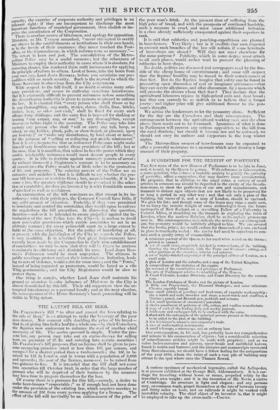THE LATEST BILL ON 111::ER.
Ma. PARINGTON'S Bill " to alter and amend the laws relating to the sale of Beer," is an attempt to snake the beverage of the poor man dearer. Not content with doubling the price of his bread— that is, of giving him half a loaf for a whole one—by their Corn-laws, the Squires now endeavour to enhance the cost of another chief necessary of life. The wothts operandi is simple. Under the pre- sent law, any person may take out an excise-licence for selling beer, on payment of 2/. 2s. and entering into certain securities : Mr. PA K 1NGTON'S bill proposes that no licence shall be given to per- sons occupying premises rated at less than 101. per annum, and occupied for a shorter period than a twelvemonth ; the 101. to be raised to 151. in London and in towns with a population of 5,000 and upwards; the cost of the licence, moreover, to be raised from two guineas to five. It is intended that the bill shall not come Into operation till October 1840, in order that the large number of persons who will be deprived of their business by the measure may have time to prepare themselves for the loss.
Of course there is a pretence for this bill,—namely, a desire to make beer-houses " respectable :" as if enough had not been done under the provision of the existing law, which requires sureties to the amount of 20/. front every person applying for a licence. The effect of the bill will inevitably be an enhancement of the price of the poor man's drink. At the present time of suffering from the high price of bread, and with the prospects of continued hardship, such a measure is cruel, and must cause additional irritation in a class already sufficiently exasperated against their superiors in rank.
It is said that robberies and poaching-expeditions are planned in beer-houses. Very likely ; but is it credible that men disposed to commit. such breaches of the law will refrain, if seine hundreds of beer-shops are closed ? Will they not meet elsewhere for the same purpose ? Publicity, which in some degree must attach to all such places, would rather tend to prevent the planning of robberies in beer. shops.
No doubt, polities are discussed and newspapers read by the fire- side of the cheap house of entertainment ; and some will suspect that the Squires' hostility may be traced to their consciousness of that filet. But do the Squires imagine that safety can be found in preventing open discussion of real or imaginary grievances—that they can secure allegiance, and allay discontent, by a measure which will provoke the classes whom they fear ? They declare that the agricultural labourers rejoice in high-priced corn and dear bread; but they can scarcely be so doltish as to believe that a longer journey and higher price will give additional flavour to the pea- sant's draught.
We advise the landowners to let the peasantry alone. Sufficient for the day are the Corn-laws and their consequences. The estrangement between the agricultural working men and the class above them needs not to be increased. Ignorance of what is done in Parliament will prevent any serious opposition to the bill from the rural districts ; but should it become law and be enforced, we should not envy its authors and supporters in the long winter nights.
The Metropolitan owners of beer-houses may be expected to offer a powerful resistance to a measure which must destroy a large amount of their property.


























 Previous page
Previous page